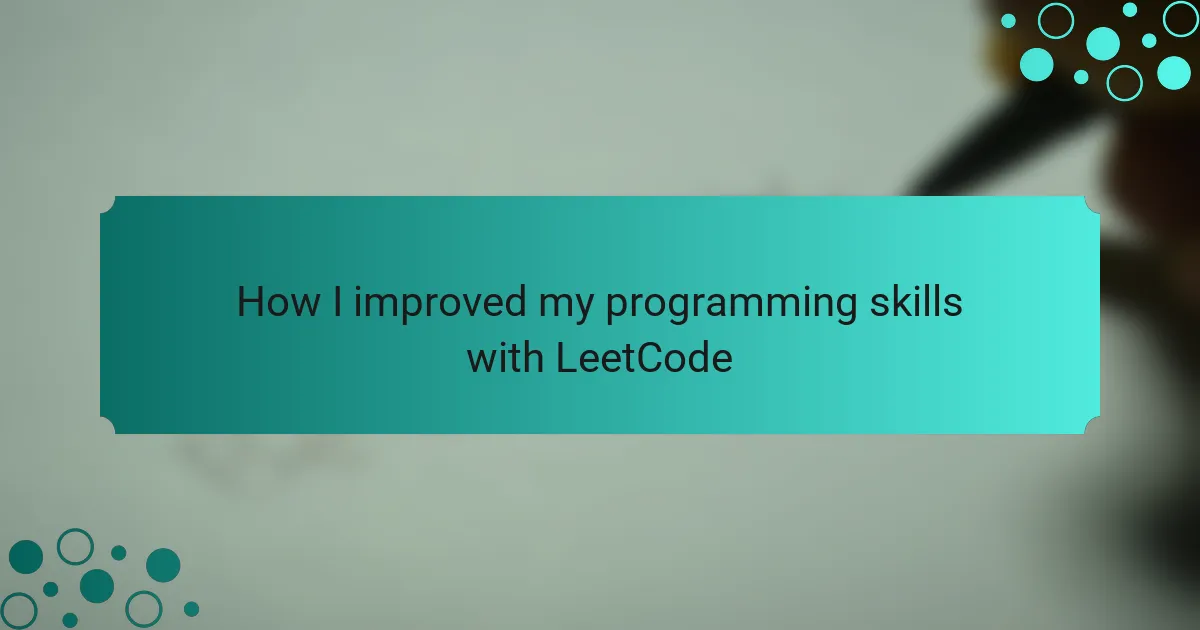Key takeaways
- Engagement with various types of programming tutorials (video, interactive, text-based, project-based) enhances learning and skill development.
- Consistent coding practice improves problem-solving skills, boosts confidence, and prepares individuals for technical interviews.
- Effective problem-solving strategies include breaking down challenges, practicing diverse problems, and regular review of previously tackled issues.
- Key lessons from coding include resilience, the importance of simplifying complex problems, and embracing mistakes as learning opportunities.
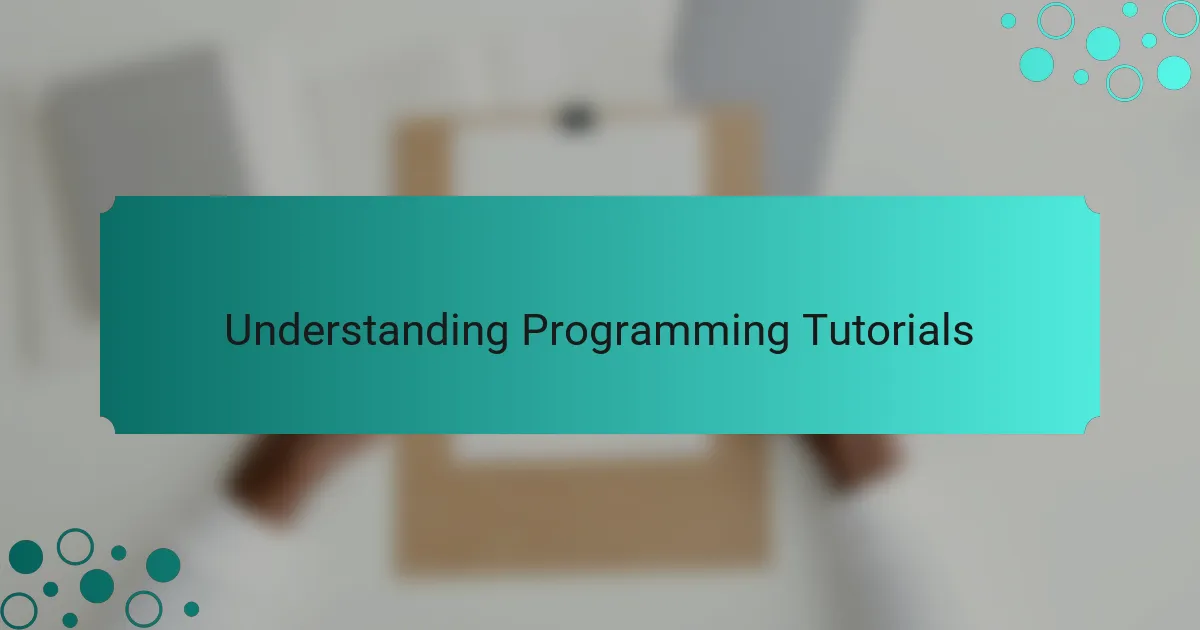
Understanding programming tutorials
Programming tutorials can be incredibly valuable resources for anyone looking to enhance their skills. I remember the mix of excitement and frustration I felt when trying to tackle new concepts. Each tutorial presented a unique perspective, helping me build a solid foundation in programming.
While some tutorials offer step-by-step instructions, others encourage a hands-on approach, allowing you to learn by doing—something I learned was crucial for my growth. I found that engaging with tutorials that prioritized practice over theory kept me motivated and helped solidify my understanding.
Here’s a comparison table to illustrate different types of programming tutorials:
| Type of Tutorial | Description |
|---|---|
| Video Tutorials | Visual learning with demonstrations and explanations |
| Interactive Coding Platforms | Hands-on practice with real-time feedback |
| Text-based Tutorials | Step-by-step instructions, often including code snippets |
| Project-based Tutorials | Build projects to apply concepts in real-world scenarios |
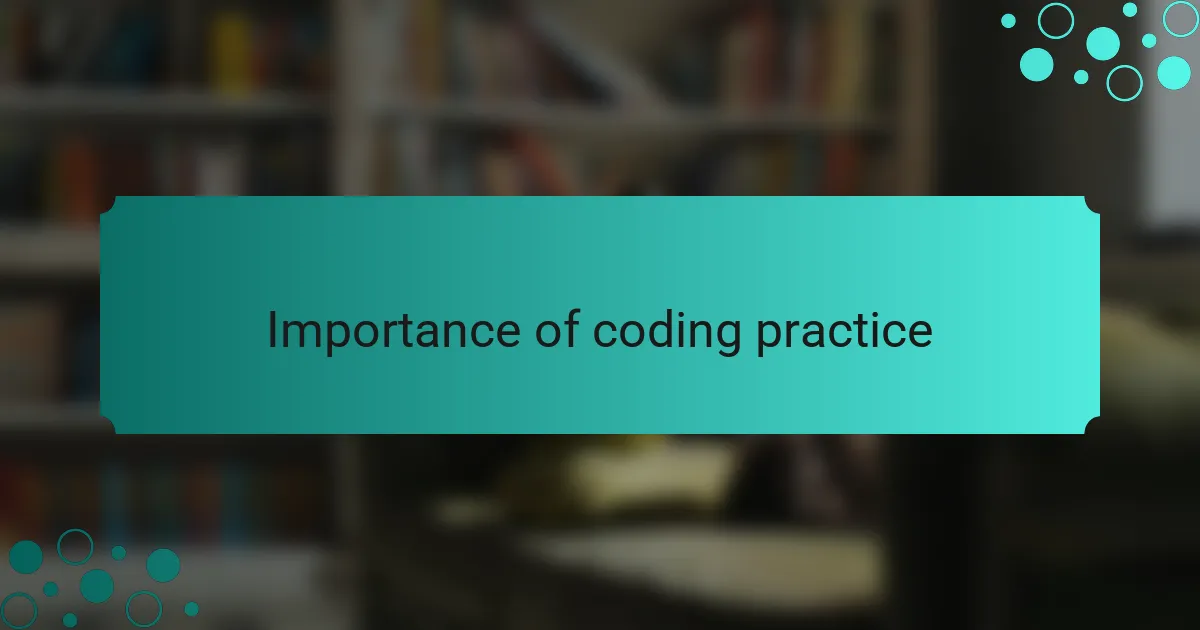
Importance of coding practice
When I first started programming, I quickly realized that understanding theoretical concepts wasn’t enough. It was coding practice that helped solidify my knowledge and build my confidence. I distinctly remember the day I solved my first LeetCode problem—it felt like unlocking a new level in a video game.
Practicing coding regularly not only improves problem-solving skills but also enhances one’s ability to think logically and systematically. I found that the more I practiced, the more comfortable I became with different data structures and algorithms. Each solved problem felt like a small victory, motivating me to tackle even harder challenges.
Here’s a brief comparison to illustrate the benefits of coding practice:
| Aspect | Importance of Coding Practice |
|---|---|
| Skill Development | Improves problem-solving and logical thinking |
| Confidence Boost | Increases self-assurance in coding abilities |
| Real-World Applications | Prepares for technical interviews and job challenges |

Introduction to LeetCode platform
LeetCode is a powerful platform designed specifically for coding enthusiasts and professionals alike. It offers a vast collection of coding problems that cater to all skill levels, making it an ideal space for anyone looking to improve their programming expertise. I still recall the initial thrill of navigating through its user-friendly interface—that sense of possibility was palpable.
What sets LeetCode apart is its emphasis on real-world interview preparation. Each problem you tackle not only hones your coding skills but also familiarizes you with the types of questions you may face in technical interviews. Personally, I often found myself diving into challenges late into the night, eager to unravel the complexities of each task, while feeling the adrenaline of competition.
Moreover, the community aspect of LeetCode is something I greatly appreciate. Interacting with fellow coders through discussions and solution sharing fosters a collaborative environment. How many platforms can say they bring together people from diverse backgrounds, united by a common goal: to master coding? Engaging with others not only enhanced my learning experience but also kept me accountable in my practice journey.
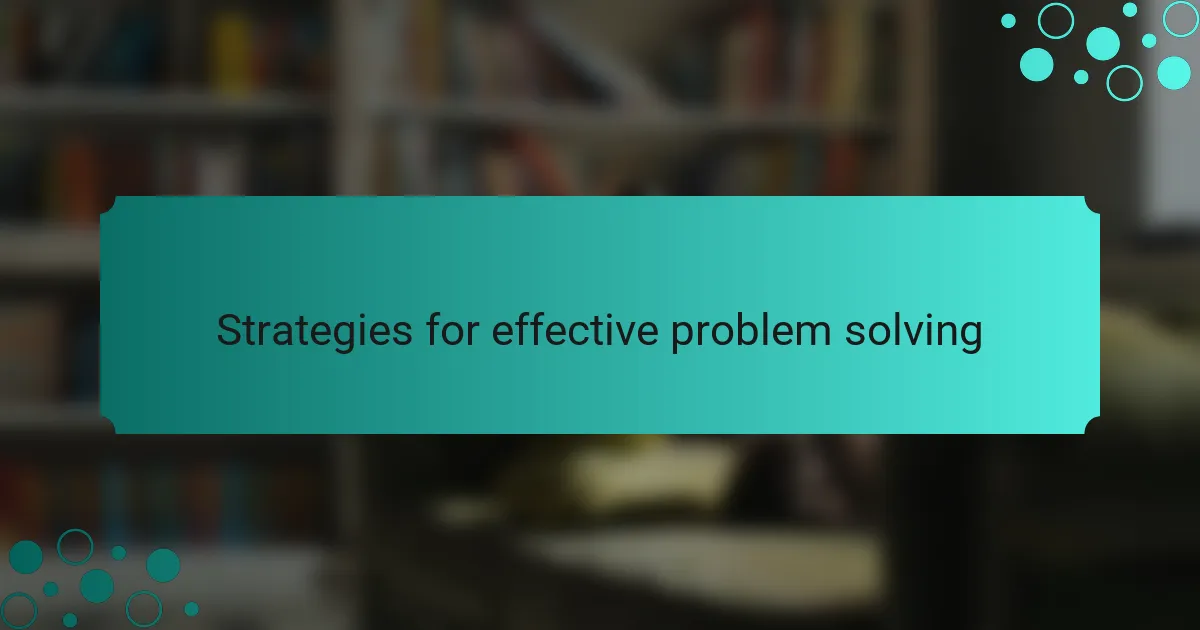
Strategies for effective problem solving
When it comes to effective problem solving on LeetCode, I’ve found that a systematic approach yields the best results. One strategy is to break down the problem into smaller, manageable parts. This method not only simplifies the solution but also minimizes the feeling of being overwhelmed, which I’ve experienced often when tackling tricky challenges.
Another valuable approach is to practice a diverse range of problems, allowing yourself to encounter various problem types and algorithms. Personally, I noticed significant improvement when I dedicated time to both easy and difficult problems, as it helped solidify my understanding of different concepts and boosted my confidence.
Here’s a comparison of different strategies that can enhance your problem-solving skills:
| Strategy | Description |
|---|---|
| Break It Down | Divide the problem into smaller, more manageable parts. |
| Diverse Practice | Work on a variety of problems to broaden your algorithmic understanding. |
| Consistent Review | Regularly revisit previous problems to reinforce learning. |

My journey with LeetCode challenges
My journey with LeetCode challenges began as a way to sharpen my coding skills. Initially, I felt overwhelmed by the complexity of some problems, but tackling them became exhilarating. Each solved challenge boosted my confidence and made me crave the next one – it was like unraveling a puzzle that constantly pushed me to think outside the box.
I vividly remember one particular challenge that took me several days to crack. The sense of achievement I felt when I finally did was indescribable. It was moments like these that made me realize how much I was growing as a programmer, not just in technical skills but also in perseverance and patience.
Here’s a comparison of some of the challenges I faced and how I overcame them:
| Challenge | My Approach |
|---|---|
| Dynamic Programming | Started with simpler problems and gradually increased difficulty while studying patterns. |
| Graph Traversal | Broke down problems into smaller parts; used visualization to understand connections better. |
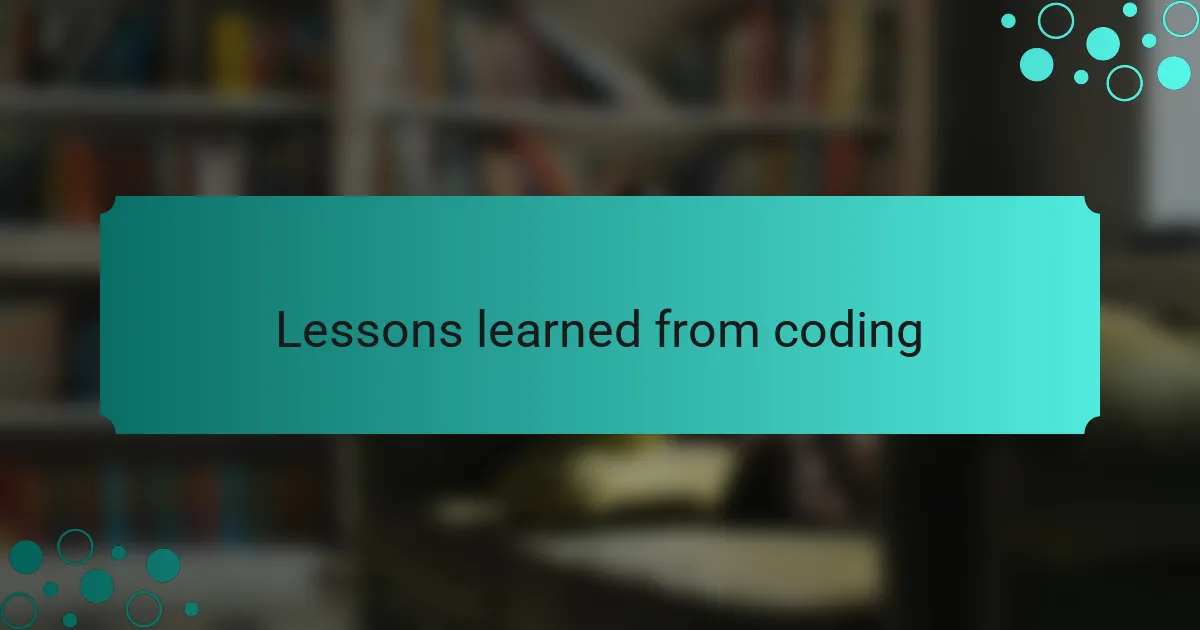
Lessons learned from coding
Coding has taught me some invaluable lessons that extend beyond just algorithms and data structures. One significant lesson is the importance of resilience. I remember facing a particularly daunting problem I struggled with for days, feeling frustrated and tempted to give up. But overcoming that challenge taught me that persistence is key. Every setback is an opportunity to learn and grow. Have you ever experienced that moment when everything clicks after trying for so long? That’s the sweet reward of determination.
Another lesson that’s stuck with me is the necessity of breaking down complex problems into simpler components. I often found myself overwhelmed when confronted with intricate challenges. By dissecting these problems, I noticed it became much easier to formulate my solutions. This method not only enhances understanding but also makes the coding process feel less intimidating. I still apply this technique in my daily programming tasks.
Lastly, I learned that making mistakes is part of the journey. Early on, I used to view errors as failures, but I’ve come to understand that each mistake is a step toward mastery. Every bug encountered brought me closer to a solution and a deeper comprehension of the concepts at play. How often do we hear that failure is simply the first step to success? Embracing this mindset has undoubtedly transformed my coding experience, allowing me to approach problems with curiosity rather than fear.
